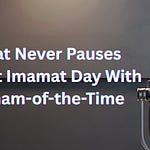How does the concept of sacrifice in Eid al-Adha relate to the Ismaili understanding of the Imamat?
Eid al-Adha is recognized as a symbol of sacrifice. In the Ismaili tradition, this commemoration of Prophet Ibrahim's (peace be upon him) willingness to sacrifice his son holds a deep esoteric meaning (ta’wil), which is considered the reality (haqiqah) of the story.
According to Ismaili interpretation, the divine command for Prophet Ibrahim (peace be upon him) to "sacrifice" his son, Prophet Ishmael (peace be upon him), does not mean to slaughter him physically, as such an act would violate the sanctity of life. Instead, the command signifies for Prophet Ibrahim (peace be upon him) to appoint his son, Prophet Ishmael (peace be upon him), as the successor to the Imamat after him. The great Ismaili jurist and Da‘i al-Qadi al-Nu‘man, in his work Asas al-Ta’wil, explains that the Qur'anic verse (37:101) about giving "good news of a forbearing boy" refers to Prophet Ishmael (peace be upon him) as the candidate for the Imamat (al-murashah li l-imamah). The dream of Prophet Ibrahim (peace be upon him) saying "I am sacrificing you" (Qur'an 37:102) means, esoterically, "I am taking upon you the Covenant of Imamat (mithaq al-imamah) and establishing you as an Imam for the divine law".
The subsequent substitution of Prophet Ishmael (peace be upon him) with a "great sacrifice" (dhibh ‘azim), traditionally understood as a ram (Qur'an 37:107), is also interpreted esoterically. Al-Qadi al-Nu‘man states that the sacrifice (al-dhibh) in the esoteric sense (fī al-baṭin) is a symbol of the taking of the covenant (al-mithaq). It signifies Prophet Ibrahim's appointment of Prophet Ishmael (peace be upon him) to the rank of spiritual interpretation (ta’wil) and secrecy (Foundership - al-asasiyya), while appointing his second son, Prophet Isaac (peace be upon him), to the rank of [trustee] Imamate as a substitute. Thus, Prophet Ishmael (peace be upon him) became the Permanent Imam (imam mustaqarr), and Prophet Isaac (peace be upon him) became the Entrusted Imam (imam mustawda), serving as a deputy or veil. The spiritual sacrifice mentioned in the context of the "great sacrifice" is understood as the spiritual sacrifice of the souls of two great individuals, Prophet Ishmael (peace be upon him) and Prophet Isaac (peace be upon him). This esoteric understanding aligns with the Ismaili view that Prophet Abraham (peace be upon him) was the Imam of his time, and the Imamat continues in his progeny by divine appointment. Prophet Muhammad (peace be upon him and his progeny) and Imam ‘Ali ibn Abi Talib (peace be upon him) descend from the lineage of the Imams from Prophet Ishmael's (peace be upon him) progeny.
This esoteric understanding of sacrifice in Eid al-Adha deeply resonates with the institution of the Imamat. Just as the sacrifice in the story symbolizes taking the covenant of Imamat, the Imamat itself is characterized by profound sacrifice. The Imam who bears the weight of the Imamat has sacrificed his entire life, soul, and being in the perpetual service of God and humankind. This is considered the ultimate spiritual sacrifice. The Imams throughout history have exemplified this spirit by dedicating their lives to the material, spiritual, and intellectual upliftment of the Jamat (community).
The sacred tradition of Nass (designation of a successor), which ensures the continuity of divine guidance in the Imamat, is also linked to the symbolism of sacrifice. When the Imam designates his progeny to succeed him, it is described as a testament to his unwavering faith and devotion, akin to the acceptance of fate by Prophet Ishmael (peace be upon him). This act of Nass is profoundly significant, symbolizing a divine covenant akin to Prophet Ibrahim's (peace be upon him) willingness to sacrifice his son in submission to Allah’s command.
The living Imam, Mawlana Haazir Imam (peace be upon him), has also emphasised this aspect of sacrifice and service. He has stated that he has dedicated his life to the uplift and progress of the Ismailis all over the world. Our 49th holy Hazrat Imam Shah Karim Al Husaini (a.s) views the responsibilities of the Imamat, inherited from his grandfather, as heavy but not burdensome, considering it a pleasure to dedicate oneself ("to sacrifice oneself") to the community and work for its people. The spiritual sacrifice of Prophet Abraham (peace be upon him) and Prophet Ishmael (peace be upon him) continues to be embodied and renewed in the lineage of Ismaili Imams and in the person of Mawlana Haazir Imam (peace be upon him).
Therefore, Eid al-Adha, through its symbolic resonance and esoteric interpretation in the Ismaili tradition, highlights the Imamat's enduring commitment to divine authority, sacrifice, and service. The festival commemorates Prophet Ibrahim's (peace be upon him) faith and reflects the Imams' dedication of their lives to the well-being and upliftment of their followers.
What is the esoteric meaning of sacrifice?
The esoteric meaning of sacrifice in the Ismaili tradition, particularly as related to Eid al-Adha and the story of Prophet Ibrahim and Prophet Ishmael, is understood as follows:
Beyond the Literal: The Ismaili tradition does not understand the story of Prophet Abraham's sacrifice of Ishmael according to its literal apparent meaning, as a divine command to physically kill one's child would violate the sanctity of life. Instead, there is a deeper spiritual meaning, the esoteric meaning (ta’wil), which is considered the reality (haqiqah) of the story.
Appointment to Imamat: The divine command for Prophet Abraham (peace be upon him) to "sacrifice" his son, Prophet Ishmael (peace be upon him), esoterically means that Prophet Abraham was commanded to appoint his son, Prophet Ishmael (peace be upon him), as the successor to the Imamat after him.
Taking the Covenant: Prophet Abraham's dream of sacrificing his son (Qur'an 37:102) is interpreted esoterically as "I am taking upon you the Covenant of Imamat (mithaq al-imamah) and establishing you as an Imam for the divine law".
Symbol of the Covenant: The substitution of Prophet Ishmael (peace be upon him) with a "great sacrifice" (dhibh ‘azim) (Qur'an 37:107), traditionally understood as a ram, is also interpreted esoterically by al-Qadi al-Nu‘man. He states that the sacrifice (al-dhibh) in the esoteric sense (fī al-baṭin) is a symbol of the taking of the covenant (al-mithaq). This signifies Prophet Abraham's appointment of Prophet Ishmael (peace be upon him) to the rank of spiritual interpretation (ta’wil) and secrecy (Foundership - al-asasiyya), being silenced from public teaching, and appointing Prophet Isaac (peace be upon him) to the rank of [trustee] Imamate (mustawda) instead. Prophet Ishmael was the Permanent Imam (imam mustaqarr), and Prophet Isaac was the Entrusted Imam (imam mustawda), serving as a deputy or veil. The "great sacrifice" refers to the spiritual sacrifice of two great souls, Prophet Ishmael and Prophet Isaac, who were appointed to the Imamat.
The Imam's Sacrifice: More broadly, the concept of "sacrifice" means to "make sacred". The Imam who bears the weight of the Imamat has sacrificed his entire life, soul and being in the perpetual service of God and humankind, which is considered the ultimate spiritual sacrifice. The Imams throughout history have exemplified this spirit by dedicating their lives to the material, spiritual, and intellectual upliftment of the Jamat (community).
Nass as Sacrifice: The sacred tradition of Nass (designation of a successor) is also linked to the symbolism of sacrifice. When the Imam designates his progeny to succeed him, it is a testament to his faith and devotion, akin to the acceptance of fate by Prophet Ishmael (peace be upon him). This act symbolizes a divine covenant similar to Prophet Ibrahim's willingness to sacrifice his son in submission to Allah’s command.
Living Embodiment: The spiritual sacrifice of Prophet Abraham (peace be upon him) and Prophet Ishmael (peace be upon him) continues to be embodied and renewed in the lineage of Ismaili Imams and in the person of Mawlana Hazir Imam (peace be upon him). Mawlana Hazir Imam has explicitly stated he has dedicated his life to the uplift and progress of the Ismailis and the world of Islam.
Thus, the esoteric meaning of sacrifice in this context is primarily about taking and fulfilling a divine covenant, specifically the Covenant of Imamat, and it is continuously exemplified by the Ismaili Imams through the dedication of their lives to service.
Credits To:












